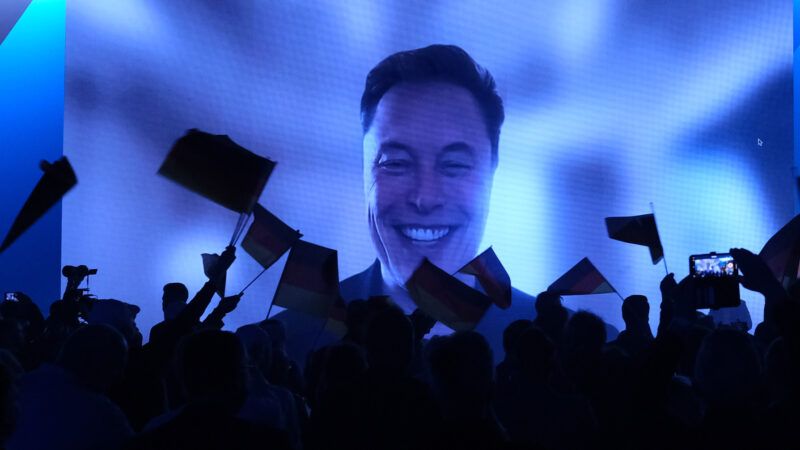No, Elon: It Isn't Illegal To Boycott X
Elon Musk sues seven more companies for pulling advertising from his platform.

While news cycles in the first Donald Trump presidency were dominated by Trump's erratic social media pretense, news cycles during Trump 2.0 seem so far to be dominated by the erratic social media titan Elon Musk. The X CEO and leader of the newly created Department of Government Efficiency (DOGE) made a splash last weekend after DOGE representatives were given access to the Treasury Department payment system. But there is another interesting—if less sensational—story involving Musk from this past weekend, and it's notable for the way it illustrates the facade of Musk's professed support for free speech and free markets.
On Saturday, Musk added seven new targets to a lawsuit accusing advertisers of violating U.S. antitrust law by choosing not to advertise on X.
Musk first filed this suit last August against the World Federation of Advertisers and the companies Unilever, Mars, CVS Health, and Orsted. In an amended complaint filed Saturday, he added Nestle, Abbott Laboratories, Colgate-Palmolive Company, Lego, Pinterest, Tyson Foods, and Shell.
Basically, Musk thinks it should be illegal for these companies to have simultaneously pulled advertising dollars from his company.
You are reading Sex & Tech, from Elizabeth Nolan Brown. Get more of Elizabeth's sex, tech, bodily autonomy, law, and online culture coverage.
Musk's suit alleges that these companies colluded in a way that violates U.S. antitrust law. The companies were all part of the World Federation of Advertisers and were "concerned that X, formerly known as Twitter, would stray from [the federation's] brand safety initiative called the Global Alliance for Responsible Media," reports NPR.
In response, the defendant companies and others either stopped or reduced their advertising spending on the platform. And as a result, X lost a lot of money, according to the suit.
This, in turn, made X "a less effective competitor to other social media platforms in the sale of digital advertising and in competing for user engagement on its platform," it states. In this way, the boycott allegedly violated laws against anticompetitive actions.
But in this case, X became less "competitive" because of its own actions and the actions of its founder. You can judge for yourself whether opposing Musk's new policies on Twitter/X was prudent or justified. But it is silly to suggest that companies shouldn't be allowed to oppose them just because it would make X less competitive.
Antitrust law cannot require private companies to continue associating with a company they don't wish to simply because ceasing business with that company will make it less competitive. That would be completely contrary to the ideas of free markets and open competition, and also completely contrary to the idea of free speech.
Musk tries to dress up his complaint in the language of choice and freedom, arguing that social media entities must be allowed to set their own moderation policies and that "collective action among competing advertisers to dictate brand safety standards" is bad for consumers.
And corporate entities have certainly been known to encourage atmospheres where speech—be that speech from employees, their own corporate speech, or the speech of platforms where they advertise—is overly "safe." (I once worked for a women's health website where we were forbidden from using the terms "vagina" or "rape" in headlines because advertisers didn't like it.)
But that is their prerogative. Private entities are perfectly free to encourage those they do business with to adopt certain values, and they're perfectly free to use private market mechanisms—such as boycotts—as part of this encouragement. Boycotts are a part of free markets and of free expression.
The alternative that Musk is demanding would be worse than a world of woke corporations and overly cautious advertisers. In this world, private market actors would be compelled to continue doing business with entities they wish not to and to broadcast their speech in venues they do not wish to. (Conservatives cheering on Musk should imagine how this would work out in other contexts. Do you want companies with conservative values to be forbidden from pulling ads from platforms that decided to promote porn, Kamala Harris, and DEI?)
To add credence to his antitrust claims, Musk suggests that pulling advertising was "against the unilateral self-interest of the advertisers" and "made economic sense only in furtherance of a conspiracy performed in the confidence that competing advertisers were doing the same." This falls apart upon examination. At the time Musk took over, many left-of-center people were upset about it and worried about the policies he would put in place. And many companies were (and are) concerned with appearing insufficiently attune to progressive speech standards and/or "harm" on social media more generally. Whether or not you agree with that, it's not unreasonable for such companies to worry about reputational harm that could harm their bottom line. It's also not unreasonable for them to have feared that an exodus of users would diminish the value of advertising on the platform, and to have temporarily pulled back spending to see how things shook out. In short, there are several legitimate business reasons why companies may have suspended advertising at that time.
The fact that these companies acted in tandem, not alone, is at the core of Musk's complaint. But it shouldn't make a bit of difference. Acting in tandem is how boycotts work. And boycotts—by individuals or corporations—are a form of protected speech.
Musk likes to style himself as a defender of free speech and free markets, but he's shown time and again that this principle falls to the wayside when it conflicts with his self-interest. This lawsuit serves as a perfect example.
More Sex & Tech News
• A California cop has been found guilty of "deprivation of constitutional rights under color of law" for abducting and sexually assaulting four women.
• Some meditations on where the "tech right" came from.
• Shifting age verification mandates from online platforms to app stores doesn't solve the problems with age verification, write Josh Withrow and Shoshana Weissman of the R Street Institute:
State and federal legislation mandating that sites verify users' age and adjust their social media experiences accordingly are still popular, despite the fact that they have repeatedly failed court challenges. As of late, policymakers have turned to a different model where parents have to consent to app store downloads made by their children. But this new approach is just as doomed as others because of inescapable functional and constitutional issues.
• In an attempt to exclude abortion from the definition of health care, Wyoming Republicans have offered a bill saying "No act, treatment or procedure that causes harm to the heart, respiratory system, central nervous system, brain, skeletal system, jointed or muscled appendages or organ function shall be construed as healthcare." That definition would exclude chemotherapy.
• Apple is launching a new events and invites service called Confetti.
• Today in weird AI hype:
Future You, a new interactive artificial-intelligence platform developed by psychologists, researchers and technologists that allows users to create a virtual older self—a chatbot that looks like an aged version of the person and is based on an AI text system known as a large language model, then personalized with information that the user puts in. The idea is that if people can see and talk to their older selves, they will be able to think about them more concretely, and make changes now that will help them achieve the future they hope for.
Today's Image



Show Comments (179)